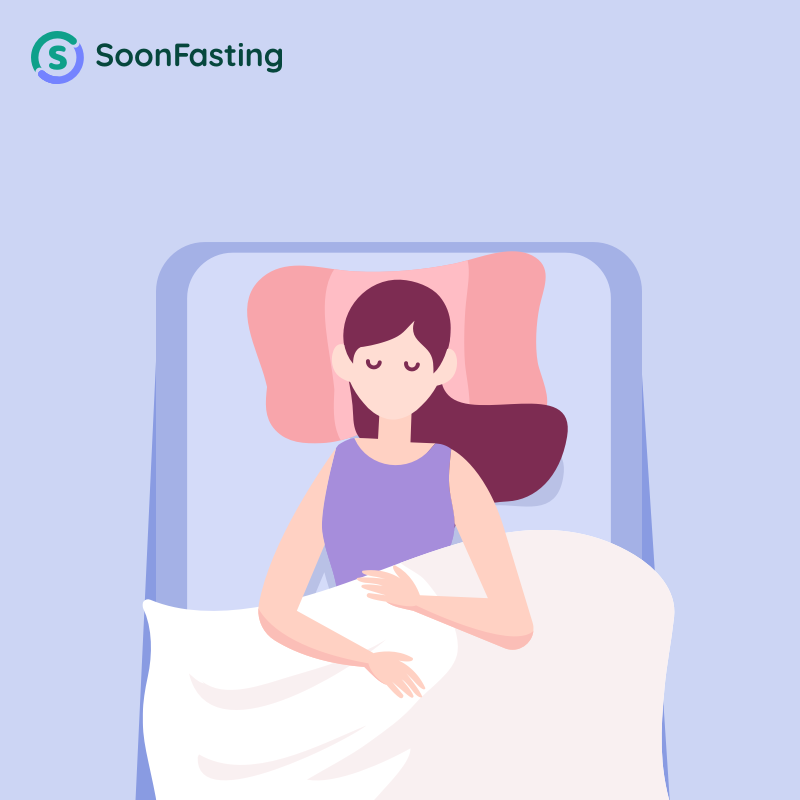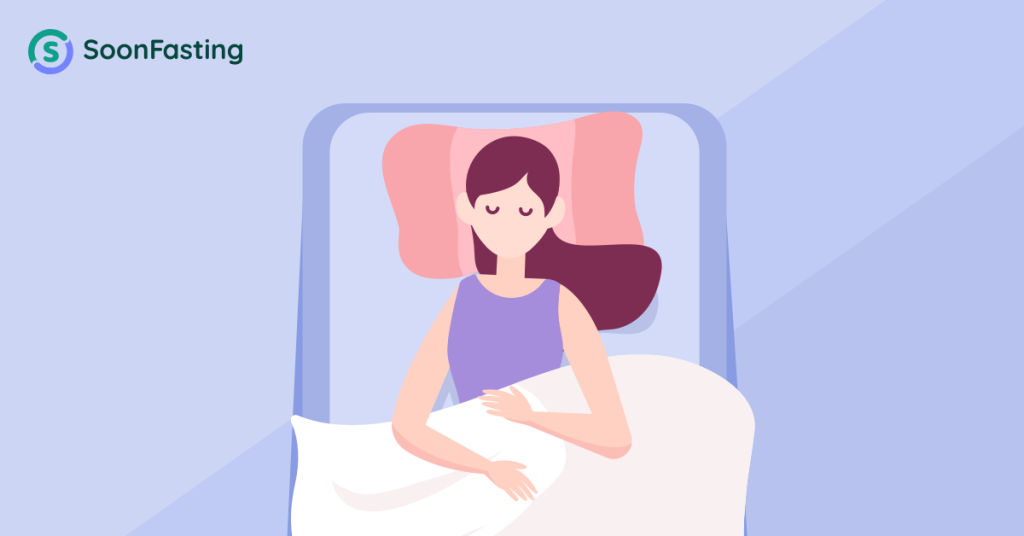If you’ve ever wondered if sleep is essential for weight loss, the answer is a resounding yes. Sleep and weight loss go hand in hand. Researchers have found that chronic sleep deprivation can lead to weight gain, regardless of the number of calories consumed, simply because lack of sleep interferes with hunger hormones and your body’s ability to burn calories while you sleep. When you don’t get enough sleep, you don’t give your body time to recharge, and you miss out on critical weight loss functions like metabolism, appetite, and cell regeneration, which all require a full night’s sleep. If you’re looking to lose weight safely and effectively, learn all you need to know about sleep and weight loss by reading this helpful guide!

Does lack sleep boost appetite?
Lack of sleep can actually lead to weight gain. Hormones are your body’s natural messengers. When you feel hungry or full, it’s because specific “hunger hormones,” leptin and ghrelin, pass to your brain. Leptin decreases your appetite and provides a feeling of satiety. Ghrelin increases your appetite and signals to your brain that you should eat. If you adhere to an appropriate sleeping schedule and consume healthy meals between fasts, your hunger hormones should function without a hitch. So when you’re sleep-deprived, you may find yourself snacking more often than you would if you were well-rested. But there are ways to reduce these cravings. For example, getting some exercise during the day can help keep your appetite in check at night. And avoid food with high sugar content or alcohol before bedtime.
Does sleep boost metabolism?
Sleep plays an important role in regulating metabolism. While you’re asleep, your body is able to restore and repair itself. This process requires energy, which means that sleep can actually boost your metabolism. People who don’t get enough quality sleep may have lower resting metabolic rates, meaning they will burn fewer calories throughout the day than those who are well-rested. Leptin and ghrelin help regulate your metabolism. Sleep deprivation can cause an imbalance in these hunger hormones and your metabolism will suffer in response. Lack of sleep can also decrease the amount of energy your body can use to burn calories. So, instead of turning the majority of the calories, you eat into fuel, your body ends up storing those calories as fat. When you are well rested, your brain releases hormones like serotonin and norepinephrine which make it easier for your body to break down fat cells. It also makes it easier to remember what you eat during the day and when. So if you want to lose weight or maintain a healthy weight, try going to bed earlier!
Do physical activities boost sleep?
Exercise is not only good for your overall health, but it can also help you get a better night’s sleep. One study published in the Brazilian Journal of Psychiatry found that moderate resistance training and stretching exercises are beneficial to people with insomnia. Similarly, subjects who participated in moderate aerobic sessions reported decreased sleep onset, fewer waking episodes during the night, longer sleep duration, more sleep efficiency, and less overall anxiety. Exercising before bed will give you more energy throughout the day, and it will help prevent insomnia. If you’re having trouble falling asleep, try doing some light exercises an hour or so before bedtime. Just don’t work out too close to bedtime because if your body temperature rises too much when exercising then this could make it difficult to fall asleep quickly.
How does sleep work with obesity?
Lack of sleep can actually lead to weight gain. This is because when you’re tired, you have less energy to exercise and make healthy choices. Plus, when you’re sleepy, you tend to crave sugary, high-fat foods. And if you’re not getting enough shut-eye, your body produces more of the hormone ghrelin, which tells you when you’re hungry. Research also shows that people who don’t get enough sleep are more likely to snack late at night on unhealthy fare like chips and ice cream than those who slept well. That’s why it’s important to work on both diet and exercise while getting a full night’s rest! Exercise boosts levels of the feel-good brain chemical serotonin, which leads to better sleep. And even just five minutes of yoga or meditation before bed helps calm your mind and relax your muscles so you’ll drift off easier.
Must-follow sleep tips for weight loss
If you’re trying to lose weight, getting enough sleep is key. A good night’s sleep helps to regulate your hormones, which can impact your appetite. Plus, when you’re well-rested, you have more energy for working out and making healthy choices throughout the day.
Follow these tips for a better night’s sleep:
– Exercise regularly, but don’t work out too close to bedtime because it may make it harder to fall asleep.
– Get up at the same time every morning and avoid looking at screens before bedtime. Big swings in your sleep schedule or trying to catch up on sleep after a week of late nights can cause changes in metabolism and reduce insulin sensitivity, making it easier for blood sugar to be elevated.
– Avoid alcohol and caffeine late in the day (or altogether). Alcohol may disrupt your sleep cycle by affecting how quickly you fall asleep or how often you wake up during the night. Caffeine can keep you awake for hours after drinking it, so steer clear of caffeinated drinks after 3 p.m.
Do physical activities boost sleep?
There are many benefits of exercise, but did you know that one of them is a good night’s sleep? That’s right, being physically active can help you fall asleep faster and sleep more soundly. Plus, the release of endorphins after exercising may also reduce any anxiety or stress associated with your day. If these reasons aren’t enough to convince you, then consider this: a recent study found that people who exercised for 20 minutes every day were able to lose 50% more weight than those who didn’t exercise at all! The best part is that the most effective exercises are activities like walking, yoga, swimming, or gardening—all things you can do without too much physical exertion. So if there’s anything we can recommend to make sure you’re getting a good night’s sleep, it’s moving your body!
How to boost sleep?
1. Getting regular exercise can help improve your sleep quality. Just be sure to avoid working out too close to bedtime, as this can actually make it harder to fall asleep.
2. Develop a Relaxing Nighttime Routine – Your mind needs time to shift into sleep mode, so dedicate an hour or so before bed to unwind and relax. Read, write in your journal, or try another calming activity. Dim the lights and avoid your cell phone, TV, computer, or other sources of light, since they interrupt your melatonin production. Activities that cause excitement or stress can make it more difficult for you to fall asleep.
3. Keep a cool, comfortable environment in your bedroom for optimal sleep. This means keeping the lights low and noise levels down. Besides, most experts agree your sleep environment should be between 60 and 67 degrees and free from noise and light. Invest in fans, earplugs, or blackout curtains to improve your ability to fall and stay asleep.
4. Check the Life Expectancy on Your Mattress and Pillows – Most quality mattresses have a life expectancy of nine to 10 years. Replace Polyester pillows every six months, and foam and feather pillow every three years. If you feel uncomfortable or unsupported while you sleep, your mattress or pillow may be to blame.
5. Try not to eat too late at night, as food can take hours to digest and keep you awake. Avoid large meals, alcohol, caffeine, and cigarettes before bed – All four can disrupt your snooze and make it hard to fall asleep. Better yet, begin your fasting cycle two to three hours before bed.
6. Remember that how much sleep you need is individual – some people require more than others. If you’re having trouble sleeping, see your doctor for tips on what you may need such as medication or other treatments.
7. It is also important to understand how insomnia is defined: If your symptoms last longer than two weeks, disrupt your daily life, and don’t respond to treatment then you should seek professional help!
Is it true that lack of sleep leads to weight gain?
There are many factors that contribute to weight gain, and lack of sleep is one of them. When you don’t get enough sleep, your body produces more of the hormone ghrelin, which increases your appetite. Plus, when you’re tired you’re more likely to make poor food choices and have less energy to exercise. While you can’t lose weight solely by sleeping more, it is an important part of a healthy lifestyle. Getting seven hours of sleep per night is optimal for overall health, including managing weight. One study found that participants who slept six hours or less per night had lower levels of leptin, a hormone that suppresses hunger. And another study published in The Journal of Clinical Endocrinology & Metabolism showed that people with chronic sleep deprivation (defined as less than six hours per night) gained 10-15 pounds over four years. Finally, another review from researchers at the University of Chicago suggests that people who get too little sleep may be susceptible to overeating due to changes in their hormones and brain activity.
Bottom line
Successful weight management is complicated, and a good understanding of the root causes of weight gain and barriers to weight management is essential to success. The solution is not as simple as “eat less, move more, sleep more.” However, an accumulating body of evidence suggests that sleeping habits should not be overlooked when prescribing a weight-reduction program to a patient with obesity. Sleep should be included as part of the lifestyle package that traditionally has focused on diet and physical activity.
